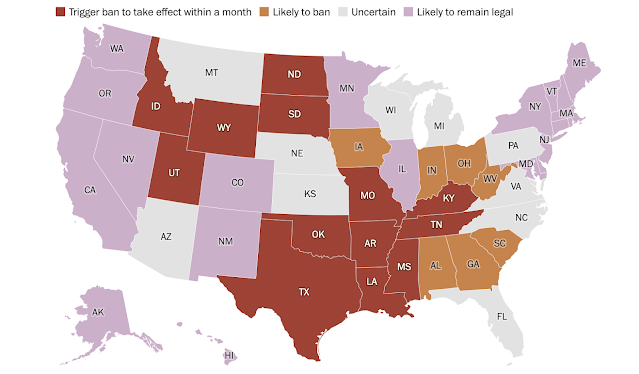 |
| How the overturn of Roe v. Wade will affect abortion in the states Map by The Washington Post; click the image to enlarge it or click here for the interactive version. |
The Supreme Court overturned Roe v. Wade today, "touching off a cascade of anti-abortion laws that probably will take effect across roughly half the country," The Washington Post reports. "Without the landmark precedent in place, the national abortion landscape will change quickly. First, 13 states with 'trigger bans,' designed to take effect as soon as Roe is overturned, will ban abortion within 30 days. Several other states where recent anti-abortion legislation has been blocked by the courts are expected to act next, with lawmakers moving to activate their dormant legislation. A handful of states also have pre-Roe abortion bans that could be brought back to life." Lou Jacobson of Politifact has a state-by-state rundown.
Though most state legislatures have adjourned for the year, some governors have expressed interest in convening a special session to pass anti-abortion laws or remove anti-abortion laws already on the books, the Post reports. Here's a roundup with more on the watershed court decision:
The decision "will send shockwaves through the U.S. health-care system," including "thousands of unplanned births and thus the increased likelihood of maternal morbidity and mortality," said The Commonwealth Fund, a New York-based foundation that promotes a high-performing system.
Overturning Roe will likely increase births in rural areas and strain already stressed maternity services in rural hospitals, say experts. Read more here.
The poor will be most affected, says The Economist, and the rural poor even more so, since people with more time and money will likely travel to another state to get an abortion, says The Daily Yonder. Some firms said they would cover employees' travel for abortion, The Hill reports.
The rural impact is best seen in maps. NBC News has an interactive map showing the distance and time to the closest abortion clinic from all U.S. cities of more than 50,000. UPDATE: The New York Times has maps that show the distance for every county and how that changed in the hours after the decision and how it is likely to change soon.
Some states are cracking down on doctors' ability to prescribe abortion pills via telehealth and pharmacies' ability to distribute them through the mail. Read more here and here.
Some domestic violence survivors say abortion ban will trap many women with abusive partners. Read more here.
"Democratic county prosecutors, mayors and city council members in at least seven conservative states have vowed not to enforce strict abortion bans, arguing that their job is to protect, not harm, the public," reports Christine Vestal of Stateline.
Some editors and publishers at large news organizations are urging their employees to keep their views on abortion private, even on their personal social-media pages. Read more here.In Texas, which until recently had some of the most restrictive abortion laws in the nation, doctors worried about getting sued have delayed treating pregnancy complications until patients' lives were in danger. That could be a harbinger of the future elsewhere. Read more here.
Justice Samuel Alito wrote in the leaked draft of the majority opinion that pregnancy is no longer an economic burden since Americans now have guaranteed protection from pregnancy discrimination, guaranteed medical leave "in many cases," and medical costs that are covered by insurance or government assistance. That's not accurate, according to some experts, who say pregnancy and raising a child remain significant economic obstacles. Read more here.
Some Democrats have speculated that Native American tribes might erect abortion clinics on tribal lands to bypass state laws, but that's mostly coming from non-Natives. No tribes have advocated for such a thing thus far. Read more here.
No comments:
Post a Comment